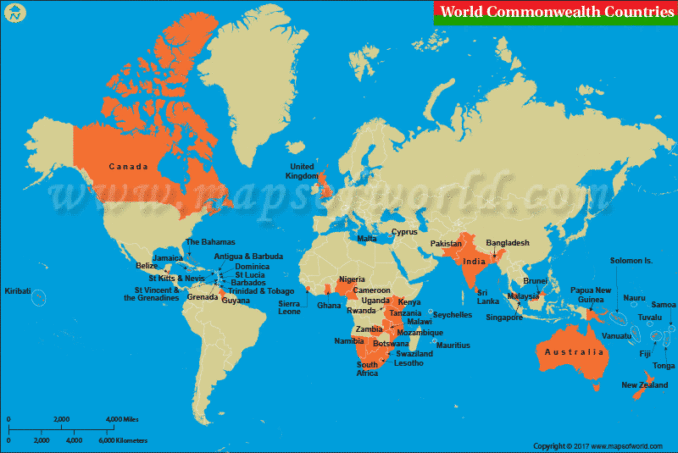How royalty reinforces imperialism through Commonwealth of Nations
As Britain’s Queen Elizabeth was near death, a professor of Nigerian heritage at Carnegie Mellon University, Uju Anya, tweeted her view: “I heard the chief monarch of a thieving, raping genocidal empire is finally dying. May her pain be excruciating.” This tweet brought down a torrent of condemnation.

The countries of the so-called ‘Commonwealth of Nations’
A personal attack by Jeff Bezos, the world’s wealthiest person, confirmed the stake this multibillionaire has in defending his class and its enshrined property rights.
Uju Anya tweeted her response: “If anyone expects me to express anything but disdain for the monarch who supervised a government that sponsored the genocide that massacred and displaced half my family and the consequences of which those alive today are still trying to overcome, you can keep wishing upon a star.”
This exchange reflects a global divide in how the British Queen is remembered. It raises the larger question: Why is the death of Queen Elizabeth treated with such overwhelming reverential attention, not only in England but in the U.S. corporate media?
Even though the United States was founded on a struggle for independence from the British monarchy, upholding “the royals” is of fundamental economic importance to U.S. imperialism. Royalty reinforces privilege, the right of class rule and the right of inheritance.
Queen Elizabeth was the official figurehead of one of the world’s wealthiest families. The British monarchy’s real estate holdings were valued at roughly $28 billion in 2021, according to Forbes and other sources; its total wealth was estimated at roughly $88 billion in 2017 by the brand valuation consultancy firm Brand Finance. The queen reportedly successfully lobbied the British government in the 1970s to change a draft law in order to conceal her private wealth from the public, claiming the disclosure would be embarrassing.
From British Empire to British Commonwealth
Of greater importance to world imperialism is that Queen Elizabeth was, and now King Charles III is, the titular Head of the Commonwealth of Nations.
Formerly called the British Commonwealth, this neocolonial political institution ropes in 2.2 billion people, one-third of the world’s population in 56 countries. Overwhelmingly the Commonwealth members are former British colonies; most are now politically independent.
More than 95% of the members of the Commonwealth are formerly colonized countries and people of color. Yet by right of inheritance, the head of this institution belongs to a fabulously wealthy white family. Today England is a country where one-third of the population are people of color, but the traditional monarch is by inheritance a white billionaire.
Members of the Commonwealth include eight Asian, 21 African, 13 Caribbean and American, and 11 Pacific Island countries. It includes the major economies of India, Pakistan, Bangladesh, Malaysia, Nigeria and South Africa, along with the economic powers Canada, Australia and New Zealand. In 15 countries the monarch is still nominally the head of state. But in order to combine all 56 vastly different countries in one institution, the British monarch is named “Head of the Commonwealth of Nations.”
Legalizing piracy
The Commonwealth is supposedly a network based on a “shared history” — a history of abuse and piracy. It maintains, even after independence, the brutal roots of the British Empire and its distorted trade routes, whereby all economic ownership relations were centered through British banks and corporations.
Being a member of the Commonwealth of Nations means accepting and making a commitment to so-called “democratic values.” What this really means is accepting continuance of the existing capitalist property relations and corporate ownership, including private corporate ownership of patents, and capitalist laws of inheritance. Many of the codes and courts that were set up under British colonial rule were left in place at the time of nominal independence.
Guaranteeing existing “ownership,” — rather than demanding Britain pay reparations to the former colonies or return the lands, resources and industries the colonizers had confiscated — was in the pact each country was forced to sign. Most countries of the British Empire were left impoverished and underdeveloped by British colonialism.
Commonwealth status in fact, although promising a protective network and continued trade for their products, forced countries to be part of an economic network based on past colonial theft and expropriation.
Zimbabwe chooses land reform
Zimbabwe, 20 years after independence through a land reform act, finally distributed land to subsistence farmers from the estates of wealthy white corporate farmers who had expropriated the land. The whole weight of the Commonwealth came down on the people. Zimbabwe was expelled, and all Zimbabwe’s ties with all African members of the Commonwealth countries and Britain were ordered cut. The U.S. of course backed up Britain in these harsh sanctions that created hyperinflation and economic chaos.
These brutal measures were intended to be an example to other African countries, where the masses were demanding land reform and distribution of expropriated land. This kind of policy is the basis of Wall Street’s support today for an institution that enforces unequal capitalist property relations.
A waning empire
Never once in 70 years did Queen Elizabeth or her family or her predecessors speak out against or even apologize for any of the crimes of British imperialism. Yet Britain demanded that every country support NATO’s war and agree to condemnation and sanctions against Russia.
None of the Commonwealth member countries in Asia, Africa or the Caribbean agreed to the U.S.-dictated sanctions on Russia — securing grain, protein, energy and development funds for their own populations was their priority. The only Commonwealth members to agree to the sanctions were Britain, Canada and Australia.
This is the clearest sign that the power of British and U.S. banks to dictate to countries of the Global South is weakening. Each country knew, from bitter experience in times of crisis, that their concerns and needs would be overlooked by the British banks and the royal family, whose generational wealth had been provided by their stolen labor and resources.

